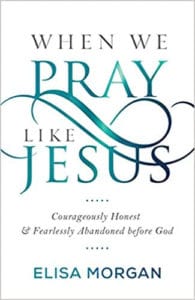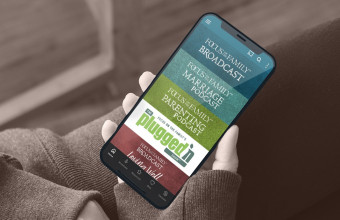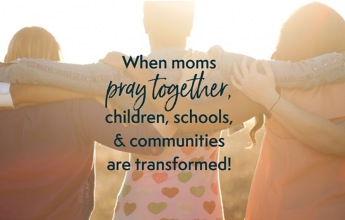Excerpt:
Mrs. Elisa Morgan: In the garden of Gethsemane, pressed between what He wanted and what His Father wanted, Jesus prays, “If you’re willing, God, take this cup from Me, yet not My will, but Yours be done.”
End of Excerpt
John Fuller: Well, many of us are familiar with that prayer Jesus spoke on the night before His crucifixion, but what does it mean for us today? You’ll find out from our guest, Elisa Morgan. This is John Fuller and thanks for joining us today for Focus on the Family with Jim Daly.
Jim Daly: John, Elisa Morgan visited our campus last summer with a message on prayer for our staff and now seems like a great time to share it with our listeners. Elisa was named by Christianity Today as one of the Top 50 Women Influencing the Culture, and she was the CEO of MOPS International for 20 years. Elisa is a blogger and podcaster and she’s authored more than 25 books, including When We Pray Like Jesus.
John: And we do have copies of that book here at Focus on the Family and if you’d like a copy call 800, the letter A and the word FAMILY. Here now Elisa Morgan on today’s episode of Focus on the Family.
Elisa: Hey. It’s so good to be here. So, one Thursday afternoon, I was heading out for a two-week ministry trip in Australia, and I had to go through LA and landed and had a long, like, five-hour layover. And so, I bided the time chatting it up with my husband, Evan. And he was to have accompanied me, but an unexpected surgery on his ankle meant that he needed to stay home ’cause that long flight wasn’t good for things like blood clots and stuff, you know? So, I’m chatting with him, and then I board the plane, and I take off for Melbourne. And I land, like – I don’t know – 4,000 million hours later? And I carefully take my phone, and I turn on all of those little things that he had turned off for me so I wouldn’t incur data roaming charges. And my phone blows up with these texts and voicemails from my husband. He goes, “Give me a little call, and I’m gonna give you an update on my leg.” So I pull my giant roller board that has two weeks’ worth of clothes over to the side of the arrivals hall in the airport, and I speed dial my husband. And he goes, “Hey, how was your flight?” I’m like, “Fine. What’s going on?” He goes, “Had a little bump here. I’m – I’m in ICU.” What? I had just left the man healthy and whole and joyful and doing just fine. “I’m in ICU.” He tells me he’s got 103 fever and his leg has blown up with this crazy, life-threatening blood infection in a matter of hours. My heart hits the floor at this linoleum hall. And I just reach up for God.
Now, I gotta confess that I’m not exactly prayer warrior material. I mean, I’m not, like, the poster child on the National Day of Prayer. They don’t have Elisa right there. I want to say I didn’t grow up in a house of prayer – you know, a house where prayers are uttered over meals or before you go to school in the morning or before you go to bed or at all, anywhere, out loud, ever. That was my house. Now, I did go to church as a child. My single mom dropped off my sister and I at church. She was so super smart because she would get to have two hours of uninterrupted mommy time alone. Oh, she was brilliant. So, I knew about God, and I loved God. But I wouldn’t call myself a prayer warrior. Yeah, I’ve been to seminary. Yeah, you know, I have done lots of studies on prayer. But I’ve gotta say, I’ve got a lot of prayer problems. I’ve wondered if there isn’t maybe a deeper issue going on in my heart about prayer because, you see, on the one hand, I long to pray absolutely honest before God – “this is what’s going on in me” – and tell Him every single one of my thoughts and needs. I long to lean honest with Him. But on the other hand, I think to myself, “Can I really be that honest with God, or am I gonna get zapped here?” You know, if I really am that honest, shouldn’t I instead be more godly and lean all the way towards, “What do you want, God?” So, I find myself kind of tug-of-warred between, “This is what I want, God” – an honest kind of a prayer – and, “But what do you want, God?” – a more yielded, abandoned kind of prayer. I think you probably relate.
What kind of prayer problems do you have? Likely, you’ve got a child you’re struggling about or a spouse situation. Maybe it’s a co-worker. Maybe it’s – maybe it’s something that’s – that’s to do with your pay, or maybe it’s something to do with our country, and you’re just burdened by it. What kind of prayer problems do you have today, right now, right this very second? I want to invite you to identify it and bring it forward in your heart right now, and consider this prayer problem as we’re considering what it might be like to pray like Jesus. Keep it front of mind.
When I reached out to God in Australia, I found myself glomming onto a certain Scripture that I had been reading in my regular time. That’s what happens often when we hit a crisis, isn’t it? Something we’ve been studying comes full to life in application time for us, right? And I had been reading the prayer that Jesus had prayed in the deepest hours of His life on this planet. It’s – in that moment, kind of a two-sided prayer coin was forged, and I’m gonna read it.
This is from Luke 22. And I’m gonna pick it up in verse 39, Luke chapter 22. It’s really familiar. But listen to this. “Jesus went out, as usual, to the Mount of Olives, and His disciples followed Him. On reaching the place, He said to them, ‘Pray that you will not fall into temptation.’ And He withdrew about a stone’s throw beyond them, knelt down and prayed, ‘Father, if you are willing, take this cup from Me, yet not My will, but Yours be done.’ An angel from heaven appeared to Him and strengthened Him. And being in anguish, He prayed more earnestly. And his sweat was like drops of blood falling to the ground.” Deep sincere prayer. It is the wee hours of the morning, probably around 1 o’clock, after a long day of Passover celebration and summary teachings that were offered over a meal.
Judas, the betrayer, has already slinked out to do his deed. And now the remaining 11 trudged with Jesus from the upper room through the city of Jerusalem across the Kidron Valley east to finally where they end up in Gethsemane, their destination. And Jesus asked these followers to follow, to watch and pray against what is coming next – repeatedly invites them. First, He starts with the 11, and then He singles out Peter, James and John to be with Him while He prays. And He gives these specific words. These words swirl in a kind of a brew with the thoughts of all the religious leaders and the Roman authorities that the disciples have been taking in. And with their stomachs full and their heads tired, they dip and they doze.
And Jesus is left alone. And in this crucible, in the garden of Gethsemane, pressed between what He wanted and what His Father wanted, Jesus prays, “If you’re willing, God, take this cup from Me, yet not my will, but Yours be done.” Do you know this prayer is recorded in three of the four Gospels? Matthew, Mark and Luke all share this prayer, and John alludes to it. In all four of the Gospels, there’s these two sides of Jesus, two sides of prayer – a prayer coin, a prayer coin.
We think to ourselves, “Wait.” You know, Jesus invited His disciples then in the first century, but we have these words here in our Bible for us in the 21st century. As He invited those disciples, is He not also inviting us disciples, you and me, our 21st century disciples to join Him in this prayer?
What might happen if we pray like Jesus? What might be changed inside of us? And so, I want to look at both sides of these – the prayer coin – both sides. The first side is take this cup, yet not my will, but Yours be done. These three raw words punctuated by bloody sweat, and Jesus offers them up in a garden. Is there ever been a more honest prayer? “Take this cup.” If you translate it, it means, what I want, God. I like to call this the honest side of prayer. Take this cup – what I want – the honest side of a prayer coin.
It’s actually kind of startling to see this side of Jesus – isn’t it? – this kind of splayed out, vulnerable, broken side of Jesus. We picture Him all Godly all the time, don’t we? And he is all Godly all the time, but He’s also human. And He shares – He rips open His heart to say to God exactly what He wants. How could He say such a thing to the Father? How could He? How could He apparently choose for Himself and apparently against His father with such a prayer? “Take this cup.” It makes us uncomfortable. We kind of, like, squint and wince and turn away from this vulnerable Jesus.
The cup that He references is super complex. Included in the cup is the Father allowing Jesus to be hurt with the punishment that sin or waywardness requires – your sin, mine, our waywardness, our pushing away from God. In the garden, bent under the weight of the unjust punishment that’s ahead of Him, Jesus hurls an honest request, an all-out plea before His Father.
Mark 14 translates it that He was deeply distressed and troubled. Matthew says that He was overwhelmed with sorrow to the point of grief and death. And then Luke tells us that He was so, so concerned that His sweat was like drops of blood falling to the ground.
Take this cup. As Eugene Peterson translates it in The Message, He says, “My Father, if there’s any way, get Me out of this.” Yeah. Take this cup. It can mean, “Take away from my life that thing I don’t want – this cancer, this loneliness, this abuse, this ridicule, this bullying.” It could also mean, “Give me that thing that I lack. I need finances. God, I need a safe place to live. Lord, I long for a mate. God, please give me” – honest prayer, this take-this-cup prayer unapologetically recognizes our human limitations and boldly requests help for them from the Divine.
What if we prayed that honestly before our God the way Jesus prayed? What if we prayed like Jesus – take this cup, this grief, this rejection, this misunderstanding, this wound, this addiction, this debt, this loneliness?
John: What if you took everything to Jesus? That is Elisa Morgan on today’s episode of Focus on the Family. And you can get her book, When We Pray Like Jesus, when you make a donation of any amount to Focus on the Family today. You can contribute when you call 800-A-FAMILY. Or stop by focusonthefamily.com/broadcast. Let’s go ahead return now to more from Elisa Morgan talking to the Focus on the Family staff.
Elisa: There’s a second side of this prayer coin that Jesus prayed. He also prays, “But not My will, but Yours be done,” in the same breath. In the same sentence, Jesus prays a seemingly opposite prayer – take this cup, but not My will – a prayer of abandon – not My will. What do You want, God? Abandon. What do You want, God? What do You want to do in this given situation?
I like that word abandon because there’s a kind of a dual meaning to it. It means a kind of a giving up, but there’s also this wholeheartedly tumbling into another person’s desire, like when we’re abandoned in love. Jesus abandons Himself to what the Father might want.
But let’s pause there and realize Jesus is not offering a lobotomized kind of submission. In the garden, Jesus turns to the second side of prayer with a remembering of what He knows is true about His Father. “Take this cup. I don’t want to go through this, God. No, no, no” – into an abandon of, “oh, but I trust You. We’ve been together since the beginning of time, which isn’t even beginning. We’ve never been apart. I trust You.” And I begin to see this kind of cumulative work of prayer that Jesus is expressing as He prays.
What if we prayed this way? What if we prayed this abandonly, this – “what do You want, God? What do You want to do there? And not my will that my teenager follow God, not my will that my husband adore me and cherish me, not my will that my boss decides to keep me on the payroll, not my will that my friend apologizes for what she’s done – not my will.”
So, when my heart hit the floor in Melbourne in the airport, I was wrestling between this ping-pong of this two-sided prayer. “God, take this cup, yet not my will” – what would it mean for me to pray that right here, God? “Take this cup. I do not want my husband to be in an ICU in Denver, Colorado, while I am thousands of miles away. Take this cup. I don’t want anything else to happen to Him bad. Take this cup. I don’t want to do ministry when I want to be home. I feel completely unplugged from the service of giving. Take this cup. But what do You want to do here, God?” My will rose up strong. I’m just being honest here.
And I began to wait for my Australian rep to come pick me up, just praying and praying. And I felt this kind of nudge to flip over to the other side of the prayer. “But, God, what do You want to do here?” And I sensed, in this moment, as a hush fell into me, “Elisa, maybe this is about the kids. Maybe I can use this in your kids’ lives.” And I began to think about our precious kids. They were in their real late 20s, early 30s at that time, both of them married, one with two kids, making their way out of a bunch of challenging years into some somewhat more stable years.
But I realized they had never been the ones in charge for us. We’d always been there for them. And I felt God’s nudge. “Watch what I can do in your absence, Elisa. Watch.” And I pulled myself together for three seconds – that’s about as long as I could last – and I decided, “Okay, I’ll wait.”
“Take this cup, not My will” – Jesus prayed both of these sides of prayer. And I began to wonder, how did He pray so honest? And how did He pray so abandoned in the same sentence? And I followed after Him. And I realized there’s a space between these two opposite prayers of “take this cup and not my will” – a tiny, three-letter word that’s almost easy to miss of “yet,”, a conjunction that links opposites, a necessary word that pulls them together and yet holds them apart.
While Jesus’ prayer tarried through the night, likely, He repeatedly prayed this prayer over and over. In fact, we’re told in Luke that He came back three times. There is this space between take ‘this cup and not My will’ – a pivot of sorts.
I – I picture a gymnast. Or I think about a basketball player dribbling, stopping, pivoting, turning, aiming, shooting, a pivot, a rotation, a turn, a take this cup, yet not my will. And I begin to think that in that little space between these two opposite sentiments, something is happening in Jesus’ heart that motivates Him, that clarifies Him, that aligns Him in a different way in this pivot. There is the space.
I read in John. I read John recording Jesus’ upper room prayer for His disciples then and His disciples going forward. In John 17:21, He prays most specifically, “May they be one, as You and I are one.”
And He can model that for us. He can pray that because He is one with the Father, intimately so. And He prays it for us because Jesus actually died to provide that kind of intimacy that we, too, could have it with our God.
In Australia, my 48-, 72-hour crisis of being away from my husband taught me so much as I applied this prayer. I would pull out my iPad and FaceTime Evan in ICU every hour. We found out, “Oh, my goodness, it is the flesh-eating MRSA bacteria that’s in his bloodstream.” He was minutes away from being absolutely helpless. He caught it as it began to spread. The nurses attended to them.
We would chat every single hour. And the beautiful people at Our Daily Bread Ministries where I was serving figured out a way to tape my messages so that I could return after that first initial conference and get home as quickly as possible. But in my absence, my daughter brought her dad blankets in the ICU because, at 103, he was shivering, and she thought he needed to be warmer – precious, precious offering. And my son thought he didn’t probably want to eat the hospital food, so he wanted to cook for him and bring him food. But, of course, he wasn’t eating very much. But what they were doing was speaking out of their language of love, stepping forward.
The best news of all is I was able to get home. And you know what I didn’t even notice is that because I was flying in the opposite direction, I gained a day, which made my distance from him even shorter. Best news of all – cherry on top – is Evan lived, (giggle) and he’s here, and he’s fine, and his leg is intact. The one they thought they were going to have to amputate is there, and he plays golf on it, and he walks on it, and he rides his bike on it, and he continues to live on it.
So, what might happen if we all prayed like Jesus? What if we dared to enter into this sacred place in Scripture, again, into a prayer that is included in three of our four Gospels and mentioned in the fourth? What if we entered it? What if we accepted the invitation that our God gives to join Him in this prayer?
Think about trying to practice it. And it’s a kind of – of almost like a pattern you look at. Take this cup, yet not my will. Take this cup, yet not my will. Take this cup, God, that – that my (groaning) teenage child not make horrible decisions today, God. Please keep them out of the ditches, yet not my will. And as I pray “not my will,” I’m going, “God, what do You want to do?” And sense God going, “Well, Elisa, why are you trying to protect your children from the very things I used to bring you to Me? Can you let Me be their God the way you’ve let Me be your God?” Oh, what happens? I’m stunned with it. But the more I pray repeatedly, do you see the depth that’s forged?
Take this cup, not my will – day after day, issue building on issue, struggle building on struggle, back and forth between honest and abandon until we’re finally freed in a different way.
I asked you to think about a prayer problem you have today. And it’s probably still front of mind, although it might have slipped to the back. But those prayer problems usually don’t go quiet for very long, do they?
If you have a quarter, grab a quarter and stick it in your right hand. And maybe George’s head is – is the (laughter) – the take-this-cup side. “God, this is what I want.” And you pray that prayer problem. This is for – “I’m lonely, and I really would – wanna find a mate, God. Please take away my loneliness. Please provide a spouse.” And then you put that coin to the tail side, and it’s gonna have a different state on every quarter, okay? And you’re gonna say, “But God, not my will, but Yours be done.” Well, will I choose to be single the rest of my life? I don’t want that, God. Back to the take-my-cup side (laughter), back to the right hand, to the left hand, back and forth. You can physically live out this way Jesus prayed of, “This is what I want, but what do you want, God?”
The prayer coin practice is not a formula. It’s not a magic potion, you know, that you pour it out and then, ding, ding, now you get exactly what you want. You know, it’s not a genie in the bottle. What it is is a – a way to express, in real-life, everyday practice what Jesus did in the garden as He wrestled, fully God and fully Man, with what He knew was ahead of Him, and He was absolutely terrified to face. And yet what He trusted God to pull Him through. What better illustration of our way to walk with God?
Would you pray with me? Lord, thank You. Thank You for this illustration of your Son spent and splayed in desperation before You. And thank You because He did allow Himself to be spent and splayed and then pivoted into obedience and abandon, even to the point of death on the cross. We can now enjoy a relationship of intimacy and hope and ongoing relationship with You. Would You give us the courage, dear God, to spend the prayer coin, the coin that You lavishly, lavishly forged for our benefit? In Your Name, Amen.
John: Author and teacher Elisa Morgan, speaking to our staff, on today’s episode of Focus on the Family.
Jim: I really appreciated Elisa’s message. It seems like these days, we don’t get a lot of instruction on exactly how to pray. And it’s such an important part of our Christian faith. That regular conversation with God is such a critical element of a believer’s toolbox. And our mission here at Focus on the Family is to either lead you into a relationship with Jesus Christ or help you strengthen that relationship. And there’s nothing more important to us than that. Our heart for evangelism is seen, I hope, throughout this ministry – on the daily broadcast, the podcast, through our magazines for adults and for children, and through our free streaming service called FOCUS@Home. And if you haven’t signed up for that, I hope you will. Here’s one comment we received recently: “The videos for children on FOCUS@Home have made a big difference in my 6-year-old daughter’s life. She actually told me, ‘Mom, I don’t have to be scared anymore – I can just pray instead.’ I was amazed! Thank you, Focus, for sharing such an incredible video library with us. God bless you all.” Isn’t that awesome?
John: Oh, that is a terrific comment. Just think of the impact in that one child’s life and it’s an impact throughout, uh, that free service that we’ve started to provide, thanks to our donors who fund these efforts.
Jim: Well, that’s true. And think of that being multiplied tens of thousands of times with other kids and adults. And we want to thank our donors for blessing the efforts here at Focus. That’s how it gets done. And if you can make a donation today, we’d like to send you a copy of Elisa’s book When We Pray Like Jesus. And remember, when you get it from us here at Focus on the Family, you are helping do ministry. We use the proceeds from that to help keep marriages together, help save a baby’s life. So, order through Focus on the Family today.
John: Yeah. And unlike most booksellers, we’re going to be happy to send Elisa’s book to you when you contribute a gift of any amount to Focus on the Family. That’s going to be our way of saying thanks for joining us in helping families around the world thrive in Christ. Our number is 800-A-FAMILY. 800-232-6459. Or you can donate online and get that book, When We Pray Like Jesus, at focusonthefamily.com/broadcast. And by the way, we’ve enhanced our daily broadcast app, so you can now take Focus on the Family with you wherever you go and have access not just to this broadcast, but all of our podcasts, other radio programs as well, and all of the great content that you expect from Focus on the Family. Check it out when you’re online with us. Now next time, you’re going to hear some key skills for parenting your children well.
Teaser:
Mr. Danny Huerta: This is steadfast, unwavering love that reaches into the dark moments and goes through seasons with our kids where they need somebody to bring some light, to bring prayer, to bring a listening ear, to bring guidance in places that are very confusing.



















